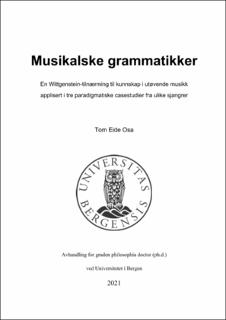| dc.description.abstract | In this thesis, perspectives from Wittgenstein's late philosophy are applied to three case studies from different genres in music performance, with the aim of identifying rules governing ways of playing and singing. The thesis is motivated by a desire to investigate music practices in the light of a promising perspective from Wittgentein’s aesthetics. This has not previously been done to this extent or in this way, and will be a contribution to research on art practices and art education. Through observation of musical knowledge management in case studies, I identify constituting rules for singing and playing. Identified rules are compiled for analysis, outlining distinctive musical grammars in the case studies. The main research question asks which ways of playing and singing constitute the case studies as aesthetic practices. Complementary research questions elaborate how these are to be identified: Which ways of playing and singing are valued and desirable, and how are these promoted? Which ways of playing and singing are unwanted, and how are they eliminated? Comparison across the case studies clarifies similarities and differences, revealing intrinsic qualities. The research method used in the field work is structured video-based observation. The cases were selected on the basis of expectations about their information content, and are understood as exemplary paradigms in their genres. The cases are three experts leading musical practices: a violinist leading a European classical string orchestra, a singer teaching Norwegian vocal folk music, and a trumpeter and conductor leading an American style big band. Analysis of instruction and teaching in the video data generated case-specific rules for playing and singing. A key finding is that the grammars in the three cases are diverse, with contradictory ideals operating as grammar for playing and singing across the three cases. In the string orchestra case, representing classical music, rules are clear and the ideal is a high degree of homogeneity. In the vocal case, representing Norwegian folk music, there are rules related to individuals and traditions, but the main finding is a great deal of diversity and heterogeneity. The big band case is in an intermediate position, since improvisation in jazz can be understood as characterized by heterogeneity, while ensemble playing in a big band is characterized by homogeneity, governed by a grammar that is largely different from that found in the string orchestra. Finding common themes in the particular rules in the different grammars provided the basis for a conception of music performance that showed greater similarities between the cases on a more abstract level. The philosophical starting point was found to offer valid descriptions of musical practices. This thesis can deepen awareness of musical diversity, by showing how ways of playing and singing appreciated in some contexts are undesirable in others. | en_US |
